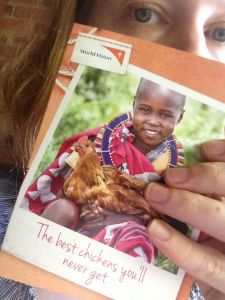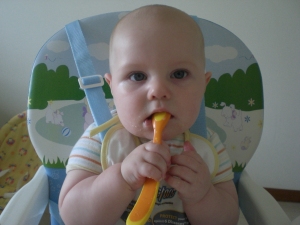I Don’t Wish You A Merry Christmas
I’ll be upfront. We mainly started the charity card tradition as a pre-emptive strike against Gift Disappointment. We figured we’d pair our kids’ presents with an Oxfam picture of a similarly-aged child who was thrilled just to be getting vaccinated and they probably wouldn’t curse us so badly for failing to shell out for the six-thousand-dollar doobywhatsit everyone else’s parents were totally buying them because they obviously love their children more than we do.
But at three, P started asking questions. “Who’s this? Why’s he on my Christmas card? How come he’s holding a cup of milk?” Well, you know how three-year-olds are.
We’d bought a school lunch for some needy child somewhere. “Maybe this boy doesn’t get breakfast at home before school,” I explained.
It was a foreign concept to P. “What does he eat at home before school instead of breakfast?”
“Well, he might not eat anything. Some kids just don’t get enough food.”
“Have they been naughty?” Because, obviously, we starve P as punishment all the time.
It took a few more exchanges to sink in, but when it did, P stopped quite still for a full thirty seconds looking troubled and shocked. Then slowly, gradually, he leaned in for a long, tight hug. In hindsight, it might have been more appropriate to sponsor some textbooks.
This year, P’s six. Old enough, it turns out, to declare loudly in front of the nice man from World Vision (and a surrounding throng of shoppers) that he doesn’t want a card with “those people” on it for Christmas. You know how dialogue is sometimes described as being “spat out”? Yeah, well, P did that.
But first he twisted his face into a scowl and emphasised the words “don’t want” by striking his fist twice against the palm of his other hand, just to get everyone’s attention. Only then did he jab his finger at a card and spit the words “those people“. It was a bit like the time I was fourteen and Mr R, our science teacher, asked me a question about aquatic organisms and in my answer I forgot to pronounce the third syllable of the second word, except everyone in the entire shop was looking at me as if I’d actively taught my child to be racist.
We moved to one side. “You’ll still get your own present, P. The card’s extra,” I assured him. But that wasn’t it. Grudgingly, he suggested a compromise where he got a card with a chicken on it, as long as no human face was included in shot.
“It’s complicated,” he said, looking at his hands as I probed him for an explanation. “I don’t know how to explain it.”
—
I’ve heard parents say they want their children to be happy. We’re supposed to bend over backwards for it; make it our main goal. We’re supposed to shelter them from truths, and invent complicated lies. “Yeah, he wears a red suit. What? Well the sleigh’s air-conditioned, you see, anyway, he probably takes his coat off somewhere south of Japan. He visits every child on earth.”
I don’t really want my kids to be happy. I mean, I don’t want them to be unhappy, at least not excessively. They’ll get presents, some from Santa, and we’ll even leave a bucket of water out for his reindeer, plus the reindeer food I bought from the RSPCA which P claims they won’t like because apparently glitter isn’t part of a balanced diet, even a magical diet. I’m not sold, though, on the concept of Permanent Fun Time.
As P played in the bath the next day, I tried again. “Does it bother you to think of all the kids out there who don’t have what they need? Is that why you don’t want a card with a picture of a person on it?” P’s agreement was so muted it was barely a whisper. I nodded. “That’s good,” I said. “I’m glad it bothers you.”
It’s human to turn our distress into anger and ignorance; to tell ourselves that the needy must have something of at least equal value; to ask whether they deserve their fate; to look firmly away. “Your conscience has to speak to you somehow when things aren’t right. What you’ve got to work out is how to answer.”
The bathwater swished through P’s fingertips as he considered, but it didn’t take long for him to speak. “Ok, I’ll take one card,” he said. Here it is:  It doesn’t say “Merry Christmas”. Instead, I’ll wish him what I wish for you, too: all the best this season, and for the new year.
It doesn’t say “Merry Christmas”. Instead, I’ll wish him what I wish for you, too: all the best this season, and for the new year.










Uhmmm….we’ll wish you a belated Christmas, Bronwyn Joy! Hehehe! Cheers to you and your family! May your 2015 be filled with more travel and adventure!
LikeLike
Happy belated Christmas! Agh, so much catching up to do after the holidays. I know you’ll have some adventures in 2015 and will bring us along in style as usual!
LikeLike
I know for the little ones in my life, I’m torn – I want to help raise them to be good, social responsible people who care about injustice and suffering, but I also want to protect them from everything ugly in the world. It sounds like you’re taking a good balance, but it can’t be easy.
LikeLike
It’s a tough balance and it’s hard to know what they’re ready for (or to know when they’ll hear something by accident which makes you wish you’d prepared them). I think I definitely wobbled a bit on this one but luckily life, and especially growing up, is full of second chances.
LikeLike
I love that it bothered P that there are kids with nothing out there. My son was getting a little “too into” Christmas saying “I want to get that” bleh bleh and we had this awesome talk about how some kids have nothing. He (developmentally delayed) is 5 and in many ways is 3 and he made this HUGE pile of toys that he wanted to give to the kids who have nothing. Amazing. Love this and I think you’re doing it just right.
LikeLike
Wow, that’s really touching. I have to say we haven’t seen a big pile of toys appearing anywhere around our house yet! For your son to do that off his own bat at such a young age (especially if he has some delays in some areas) is really advanced thinking! There are adults who’d struggle with that.
LikeLike
I think this is a very complex idea for children to grasp. Especially concerning peple he’s never met. I love the idea, but keep our charity a little closer to home. We take part in the Angel Tree at church. It’s for children of prisoners. We get an index card that tells us whether we have a boy or girl, their age and sizes, and anything special they’ve asked for for Christmas. We get to be there for the Christmas celebration when they receive their gifts, and it’s always very touching. The gifts are labelled from their imprisoned parents. It makes my daughter sad to think of what their lives might be like, and that they can’t be with their parents, but glad that we could do something.
LikeLike
Closer to home would definitely make it more real. I haven’t heard of anything like what you describe where we live (we’ve done the Wishing Tree where you leave presents for underprivileged kids but that’s a bit more abstract because you just leave the gift at the spot and that’s that).
We should probably get more involved with local projects in future, though, especially now the kids are getting older and we don’t feel quite so much like we’re drowning just trying to get ourselves out of bed in the morning! (This morning was not a good example on that front, mind you.)
LikeLike
This is an awesome idea. Having just been to west africa WITH our four kiddos, you are right…we are super privileged–too privileged if you live the contrast. Fantastic that you’re teaching your kids that. I agree with you on the kids angle–we’re a ‘kid indulging’ culture. And it doesnt do them any good.
LikeLike
Gosh yes – you would have seen some contrasts. It’s definitely tricky to strike the balance between caring and indulging. I’m not sure I do it most days but hopefully in the end a bit of both sides will rub off.
LikeLike
I have always doubted whether happiness is a gift we can give anyone, but truth and understanding surely are. Your lesson is so much more poignant than the one I heard growing up about eating everything on my plate because someone else was going without.
LikeLike
I like your line about happiness as a gift. Truth is certainly easier.
(I agree the eating-everything-on-your-plate one is a bit abstract, and not necessarily conducive to good eating habits.)
LikeLiked by 1 person
Same to you, Joy. The young are very wise sometimes. Hope you all have a wonderful 2015 and I look forward to reading your adventures!
LikeLike
Here’s to 2015. Look forward to more of your stories in the year to come as well. Children have an ability to see things at a different angle sometimes – it can be a real insight.
LikeLike
I am so touched by how you taught your kids to think of those in needy. Now I am ashamed in getting presents only for the kids and other well to do kids. My best attempt probably is donating some dollars to those boxes out on streets or maybe donating some used clothes and never knowing if they’ll reach the intended people. I must make my kids think about the needy and do something for them next Christmas. I have been wanting to do some charity work with the kids but I haven’t got time to find out how and where to go about doing it. I think your children are so blessed with a kind mum like you. Thanks for sharing this. Merry Christmas and Happy 2015 to you 🙂
Ps: I have stopped at the lobby at my work place to read this touching blog post and comment. Yours is one blog which I will stop at bus stop or somewhere with seats to stop and read. Just too inspiring 🙂
LikeLike
Singaporeans are as a whole pretty good I think – the boxes at flag day definitely count. Time is always a problem – you want to do something but you can’t be helping others before you’ve got your own house in order! The ideal is to choose something the kids can participate in as well, then you’ve got the best of both worlds (but you have to get it going).
Touched by your stopping at the lobby. It means a lot to have you say it 🙂
LikeLike
We in the Western world have what Pooh Bear would probably call a Great Much. I remind T all the time of his many blessings and comforts, and that many kids even in our own country go hungry as he devours his 4th serving. Appreciate the post, lace of humor and all.
Xx
D.
LikeLike
I like that: a “great much”. Pooh had such a way with words. It’s certainly true there are needy kids everywhere, not just overseas. Some places they’re just more visible, is all.
LikeLike
Oh man, such a heavy topic for littles (and adults to be honest), but you handled with aplomb. I haven’t quite explained the lack of food problem with any grace to my daughter who is nearly 5 now, but we do explain the toys, and every year for the last two have been having her give up the ones she no longer plays with and donate them to charity. She also collects money and food for a food bank at her school, but I still don’t think it has sunk in. Thank you for sharing.
LikeLike
Love that she’s been able to give up the toys she no longer plays with. I have to say that’s one we struggle with. Toys that aren’t played with always become “the favourite” once they’re suggested for donation! We’ve had a little success with baby toys so I guess you just have to start somewhere and go from there.
Love that your daughter collects money for the food bank. It’s great when schools get involved, too. One day it’ll sink in, I’m sure – it’s pretty hard to grasp when they’re young.
LikeLiked by 1 person
The first day of picking ones to donate is always the hardest, but she gets the hang of it. I think as with most things, the more often you do it, it gets easier 🙂
LikeLiked by 1 person
Compassion, understanding, knowledge, truth: those are wonderful gifts to give a child at any age. I don’t sugarcoat the less attractive side of life with my children and charity is one of the things I encourage them to practice on their own, in addition to “as a family”. The harsh reality that children do go without is hard for people (not just children) to grasp when they never have.
What a well written and inspiring post! Heartfelt thanks!
LikeLike
It’s great to encourage practising charity on their own. We don’t do a lot of that – it’s probably something we should focus on for 2015. It doesn’t have to be big, either – little things add up.
It is pretty hard to grasp the way some people are forced to live.
LikeLike
Incredible post Bronwyn. I will be thinking about this one for a long, long time. Just today we were talking about a “charity box at home for all the toys we no longer play with that will make other children who are not as lucky as we are happy”. I’ve had some resistance, but I really want my son to “get” why this is so important. I want him to realize how lucky he is, and that not everyone is as lucky. I want him to never take anything for granted. And yes, with that kind of awareness comes pain. But that’s the only way we can make a difference.
LikeLike
It’s definitely one of those uncomfortable lessons. Starting with the toys is probably a bit less overwhelming than starting with food! It’s really hard for kids to wrap their heads around, though – they just assume everyone lives pretty much like they do.
LikeLiked by 1 person
I’ve nominated you for the Very Inspiring Blogger Award! Hop over to my blog to find out more! http://www.sensitiveandextraordinary.com/very-inspiring-blogger-award/
(I will be reading this post very soon (it’s been on my list since you published) and will come back with something relevant. But I will leave you with this for now 🙂 )
LikeLike
Thanks! I’ll go over!
LikeLike
I don’t even know what to say that hasn’t already been said in the other comments. Your post reminds me (and hopefully others) that the true gift is to give. I love this idea and am definitely going to do it as well! Merry Christmas to you, P, T, and A! So glad to have gotten to know you and your lovely family!
LikeLike
Good to have got to know you, too. (Looking forward to your next trip to Singapore!??)
I like the way you put that: the true gift is to give.
LikeLike
Thanks! Well, I know Chad is going to have to go to Singapore sometime this year, maybe z and I will tag along. 🙂
LikeLike
Ooh! I look forward to it. Is it for work? Tell him to get in touch!
LikeLike
I will! 🙂 it’s a work thing, but if z and I tag along that means we will have lots of free time 🙂
LikeLike
Sounds like we could work with that!
LikeLike
I think this is a great tradition! Happy Holidays to you and your family! xoxo Fanni
LikeLike
Thanks, wishing you well this season, too!
LikeLike
Well said and great that P is not sheltered from the reality of life in other places where children are not as fortunate as he is. Happy holidays to you too and all the best for the new year!
LikeLike
Look forward to seeing you around in 2015!
LikeLike
This is perhaps the best Christmas post I have read yet. P and T are fortunate to have you for their mom. All the very best to you too Bronwyn!
LikeLiked by 1 person
Thanks Madhu, that’s a big compliment! Wishing you all the best not only now but for 2015 to come.
LikeLike
Had to laugh at the chicken 😀
Tricky theme though. I sometimes feel like not watching the news in the evening, I meet abused, sick and tormented people at work, sometimes it’s just enough of the miserable world. But then I get to shut it out when others have to live it. My kids should know too. And find a way to do something about it. Next year we’ll do the donation part togwther too.
LikeLike
Yeah, I think there’s a point at which it’s overload (and I think I crossed that point when P was three, by accident – maybe it could have been toys for the less fortunate instead of meals). Finding a way to do something about it would help a lot, though, I think. Maybe would feel a bit less helplessly overwhelmed.
LikeLiked by 1 person
Hard topic Bronwyn and you’ve done an excellent job introducing it to your kids. The fact that every 30 seconds a child dies of hunger or hunger related disease in this world , is hard for even adults to process. i wish you and yours a happy holiday season.
LikeLike
I don’t think anyone can really think about it too often, too deeply. The trick I guess is giving it the right amount of thought (whatever that is – it’s certainly a hard one).
All the best to you as well this season and going forward in 2015.
LikeLike
As an aside Bronwyn, I have a new Christmas Guest post over at Cordelia’s Mom. http://cordeliasmomstill.com/2014/12/25/the-christmas-kitten-guest-post-by-paul-curran/comment-page-1/#comment-7378 I would be honored if you could find the time to drop by. Thank You.
LikeLike
Bronwyn I think Grandma says it all in her comment. You are a wonderful Mom. It is challenging work teaching children that the sun and the moon and stars don’t revolve around them. Obviously P has a clear grasp of those less fortunate thanks to you.
You can delete this if you like but this post has Freshly Pressed written all over it. Well written and well lived my friend.
LikeLiked by 1 person
He’s a work in progress when it comes to the “revolving around him” stuff. It’s fits and starts. 🙂
But thanks for your kind compliments. It was certainly one of those unexpected and delicate moments – time will tell how the episode was processed by little P.
LikeLiked by 1 person
Well so sweet of him to come to understand. You are most welcome and well deserved. Truly an excellent post.
LikeLiked by 1 person
Bronwyn, you bring a tear to my eye.
On 24 December 2014 at 11:22, Journeys of the Fabulist wrote:
> Bronwyn Joy @ Journeys Of The Fabulist posted: “I’ll be upfront. We > mainly started the charity card tradition as a pre-emptive strike against > Gift Disappointment. We figured we’d pair our kids’ presents with an Oxfam > picture of a similarly-aged child who was thrilled just to be getting > vaccinated and t”
LikeLike
Didn’t mean to upset you 😉
Have a great Christmas, M. Still hoping to catch up again before the new year! (That’s when we turn back into pumpkins.)
LikeLike
Always pleased and proud of you but this post makes me specially so. Thank you for teaching P and T to think of others less fortunate than they. Love you heaps.
LikeLike
(You’re claiming credit roughly now, aren’t you?)
LikeLike
“all the best this season, and for the new year.” And who could ask for more. –Curt
LikeLike
That’s it in a nutshell. Hope 2015 is a good year for you.
LikeLiked by 1 person
A thought provoking article and an honest one at that. How many times have our cherubs caused us intense embarrassment with their outspokenness, but the flip side is we adults who are politically correct not wanting to be offensive when we really need to lay it on the line. Of course nobody should be offensive, but honesty is sometimes what we find in children rather than adults. P was just processing a very difficult issue and it was far outside his experience. The need out there is so enormous. We tried to solve it when we went to India and gave all our earnings away only to be confronted with the fact we were making ourselves dependent rather than solving the problems of the human race. There has to be a balance. Yet another issue to be confronted is that our donated dollars more often than not end up in the pocket of a ruling class rather than the people who need it. We can only do the best we can in determining where to give our dollars for the best effect. I find NGOs more effective than the UN which I look on as an ineffective money waster.
LikeLike
It’s definitely tricky to walk the right line between frankness, offensiveness, and political correctness. I think the food-related one was kind of a confronting one to start with – didn’t exactly ease him in. And yes, it’s hard to draw a reasonable line. We obviously have a lot of luxury spending (travel) and it can certainly be argued that others need that money more. (Peter Singer has some good thoughts on this with a progressive charity rate not unlike Australia’s progressive tax system.)
The argument about which aid is most effective is this whole other topic I don’t begin to claim to understand in depth. (A good blog recommendation on that front is Kirsty Evidence:
http://kirstyevidence.wordpress.com )
LikeLike